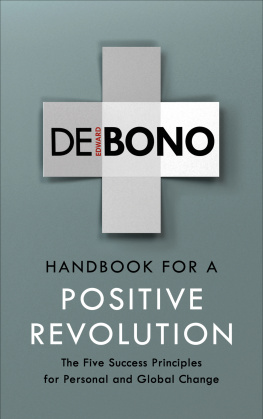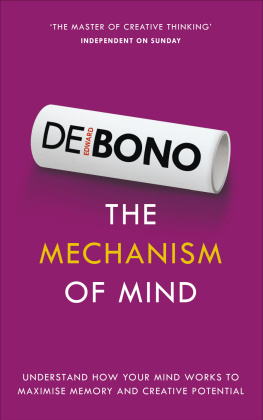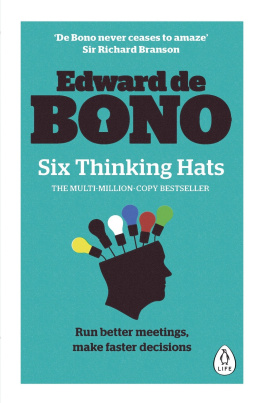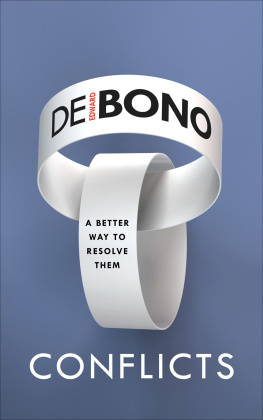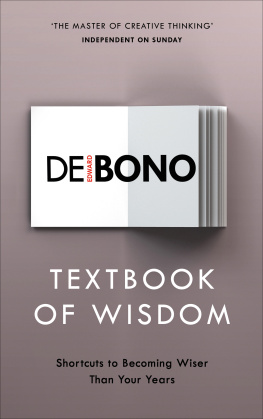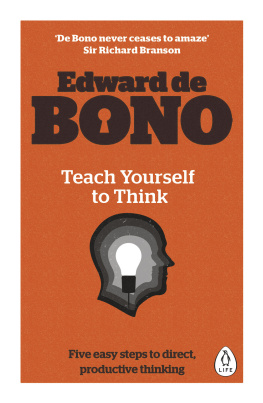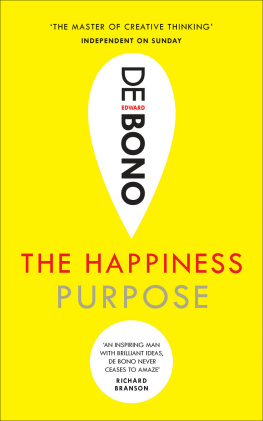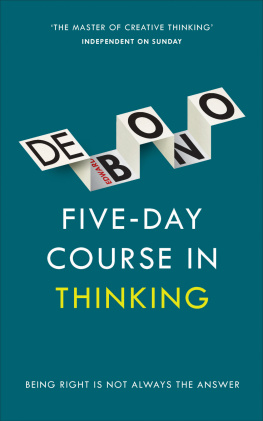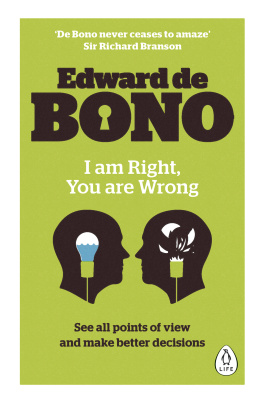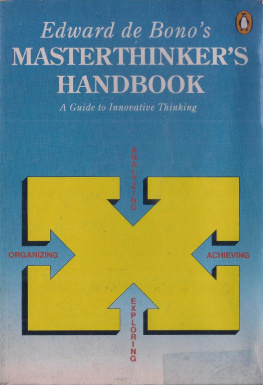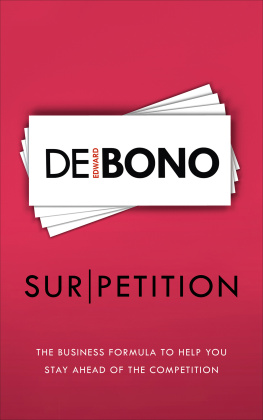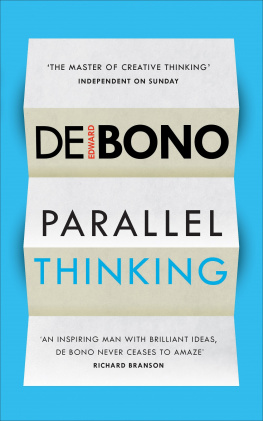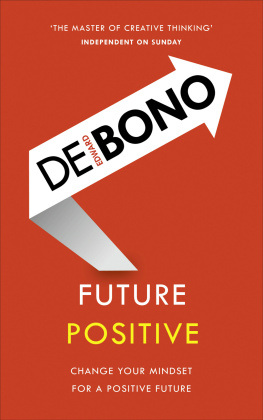CONTENTS
ABOUT THE BOOK
Anyone can join the positive revolution. All you need is creativity.
Historically, revolutions have been negative defining, overthrowing or destroying an enemy, fuelled by a sense of mission and direction. After victory, however, this energy often races on, causing factionalism and strife among the victors. The positive revolution also has energy and direction, but its opponents are entrenched patterns in thought.
Progress, maintains Edward de Bono whether on a personal or global scale depends on thinking and behaviour that are positive and constructive. The world today is undergoing dramatic, often violent changes, and human behaviour is frequently shaped by guilt and negativity. To lift this dark cloud and create positive revolution, we need to rely more on humour, a key element in changing perception.
In this inspiring book, Edward de Bono demonstrates clearly and simply how we can learn to think and interact constructively, efficiently and with respect for core human values.
ABOUT THE AUTHOR
Edward de Bono studied at Christ Church, Oxford (as a Rhodes Scholar). He also holds a PhD from Cambridge and an MD from the University of Malta. He has held appointments at the universities of Oxford, London, Cambridge and Harvard.
In 1967 de Bono invented the now commonly used term lateral thinking and, for many thousands, indeed millions, of people worldwide, his name has since become a symbol of creativity and new thinking. He has written numerous books, which have been translated into 34 languages, and his advice is sought by Nobel laureates and world leaders alike.
www.debono.com
EDITORS NOTE
Edward de Bono is the leading authority in the field of creative thinking and the publishers are delighted to be bringing this thought-provoking work back into print.
The author was writing in a different political and social era, and many of the examples he cites offer a snapshot of this time. However, though there have been considerable changes politically, socially and economically over the last thirty years or so, this important book explores key issues which still require attention, even in todays fast-paced world, and many parallels can be drawn with life today. The fundamental principles and themes in this book will encourage us to change the way we think; as the author himself says, In a rapidly changing world we are finding that our thinking is inadequate to meet the demands put on it.
Edward de Bonos teaching is as valid today as when this book was first published, and will resonate with readers for many years to come.
AUTHORS NOTE
Why bother? This is a sensible phrase to cover a sensible strategy. Go your own way. Do your own thing. Carve out a little niche in the complex world and then be happy and content in that niche. Being worried about the rest of the world is too futile and too difficult a task. Let those who are motivated to change the world work on that task. The world will always last long enough to see out your lifetime.
I am not going to disagree with this point of view but sidestep it in order to write for those who know that they are inseparably part of the world in which they live: their own internal world, the local community world and the world at large. Let the others munch contentedly like cows in the field, happy that there is grass today.
My concern has always been with human thinking because this seems to me to play so central a role in human happiness and development both from moment-to-moment and also over the longer term. I believe that we have done relatively little about thinking but have been content with a fluency of argument and the ability to attack and defend positions. This sort of thinking unfortunately lacks the creative, constructive and design energies that we really need in order to go forward. Indeed, our absurd emphasis on negativity seriously impedes such progress.
This particular book is not, however, about thinking habits and methods. This book is about the fundamental background and setting in which we would use our thinking skills. If we are disposed to be negative then our thinking skills will help us to be negative. If we are disposed to be positive then our thinking skills will take us in that direction. This is more than a moment-to-moment emotional bias it is the fundamental attitude of our being.
There are far too many people who believe that natural evolution controlled by critical negativity will form the ideas that we need just as Darwinian evolution perfected a variety of life forms. This is a dangerous fallacy. Evolution is very slow, very messy, very wasteful and is incapable of making the best use of available resources. Inadequate but not disastrous ideas and institutions will survive, perfect and defend themselves thus preventing the more effective use of resources. That has always been the logical basis for revolution.
This book is intended for those who see this logical need.
There is a useful place for negativity in changing values: in providing shaping pressures; in curbing excesses; in removing defects in order to improve an idea; and in forming the conscience of society. But the constructive and creative energies have to be there in order to get the steady, step-by-step progress that is the basis of the positive revolution. How we generate these constructive energies is what the positive revolution is about.
INTRODUCTION
This is a serious revolutionary handbook. The greatest strength of this serious revolution is that it will not be taken seriously. There is no greater power than to be effective and not to be taken seriously. That way you can quietly get on with things without the fuss and friction or resistance from those who feel threatened.
In the positive revolution there are no enemies. Traditional revolutions are negative and derive their energy from being against things. The only energy of the Marxist revolution was derived from its struggle against capitalism. Where that struggle was successful, the new system eventually died of inertia since the struggle becomes only an ancestral memory.
Is it possible to have a revolution without the rage, hatred and passion of being against something? Is it possible to have a revolution without the sense of mission and focused energy that an enemy provides? Many would say that it is not possible. Such people are locked into that old-fashioned and tiresome habit of thinking based on I am right you are wrong.
Righteousness is indeed a traditional source of energy. A simplistic view of an enemy does give the cohesion, shared views and camaraderie of professional revolutionaries. But the positive revolution is not for professional revolutionaries but for ordinary people for those amateurs who can make a difference, inch by inch. A positive revolution is not the mighty clash of the rock logic of brutally arrogant ideologies but the slow and steady power of water logic with the ability to surround and infiltrate.
The weapons of the positive revolution are not bullets and bombs but simple human perceptions. Bullets and bombs may offer physical power but eventually will only work if they change perceptions and values. Why not go the direct route and work with perceptions and values?
With the positive revolution there are no enemies even those who want to enjoy being enemies need to be denied this legitimate pleasure. There are a few who will join the positive revolution immediately. There are those who will join later when it is fashionable. There are many, including the enemies, who will be quietly bypassed. Most will not notice it is happening until it is far advanced.

